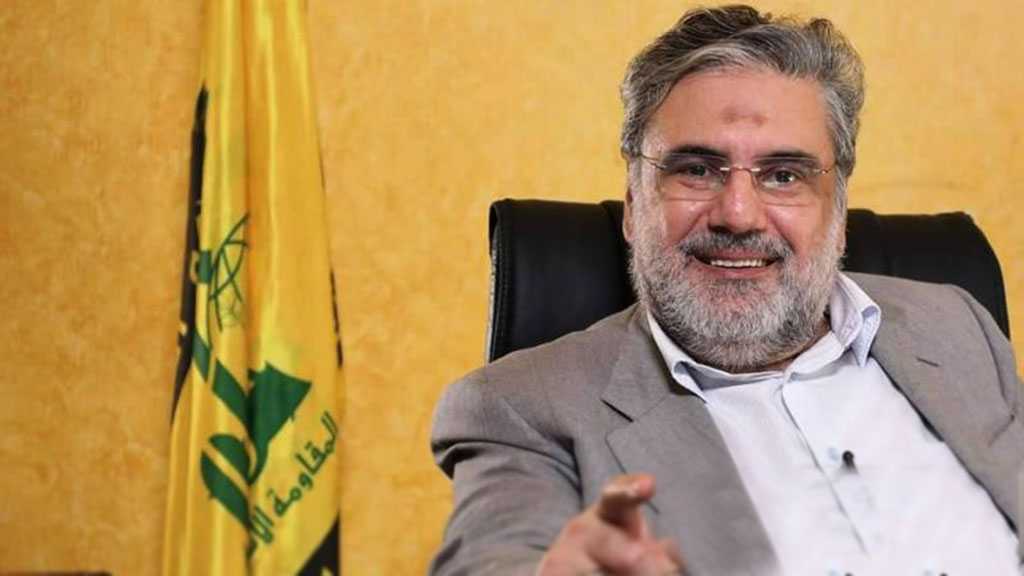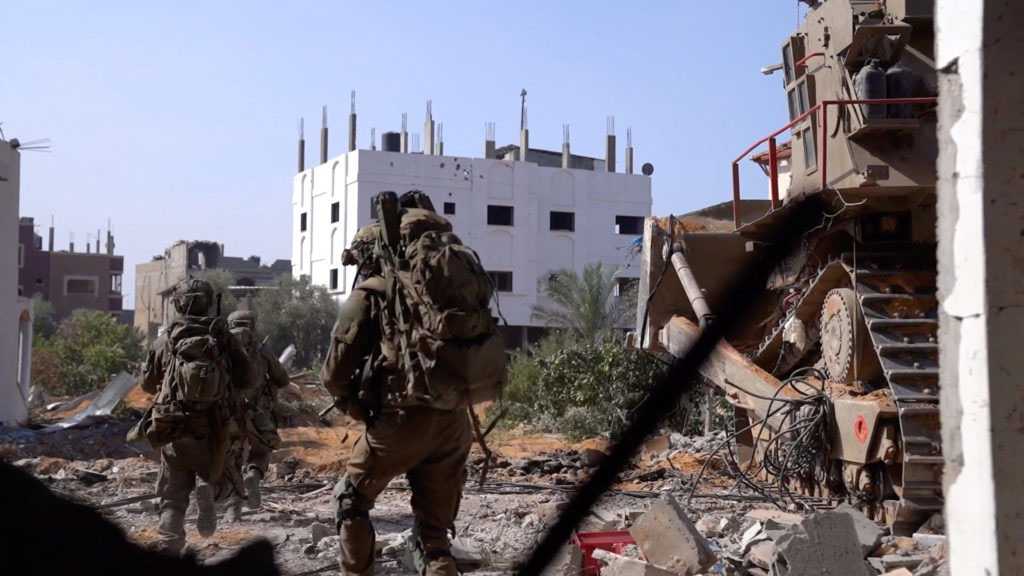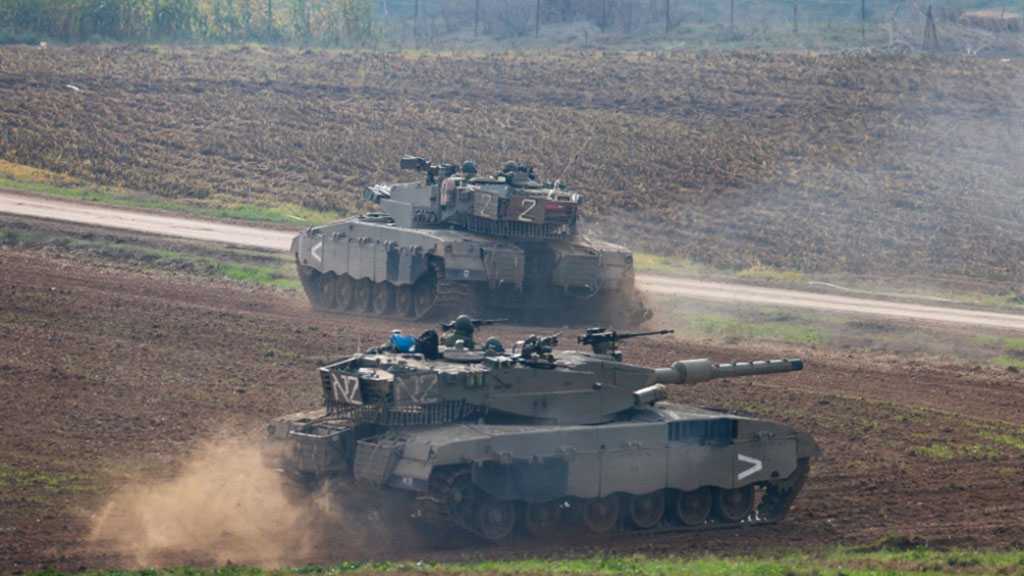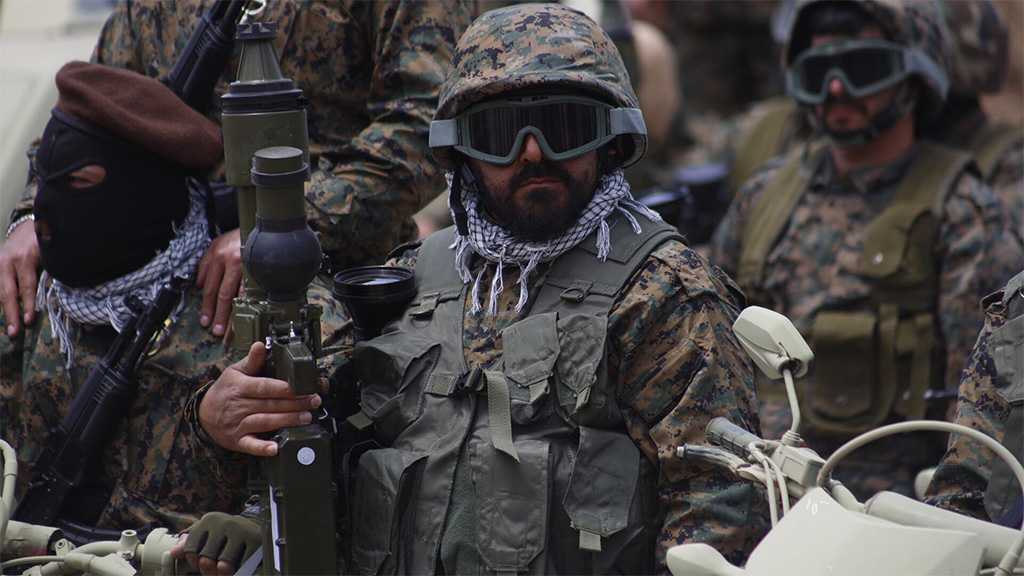
Nawaf Al-Moussawi: Oil Discoveries in Lebanon Are Inevitable Both at Sea and on Land

By Hamza Al-Khansa, Al-Akhbar Newspaper
October 27 marks one year since the maritime border demarcation agreement between Lebanon and occupied Palestine was finalized. Since then Lebanon has come a long way in joining the “club of petroleum countries”.
That said, this road was never paved with roses, but rather with many internal and external mines. Before the first candle is blown, a not so innocent despair campaign was launched. The campaign is trying to link exploration, extraction and the announcement of any potential riches from the oil reserve to urgent political challenges, such as the presidential elections, or the negotiations on naming the president, while the drilling machines are about 918 km from the intended target.
According to Hezbollah's resources and borders officer, Nawaf al-Moussawi, the one-year anniversary of the agreement consecrates two victories that have been achieved. The first is the liberation of the exclusive economic zone that the Lebanese state said belonged to it according to Decree No. 6433. The second is the breaking of the siege that was imposed on Lebanon by preventing it from drilling and extracting its petroleum wealth and benefiting from it in terms of comprehensive development.
The negotiations conducted by the Lebanese state was the appropriate way to utilize the balance of power created by the Resistance. Any negotiation that is not based on an equal or deterrent balance of power makes the negotiation process either futile or more like surrender.
“There were two types of Resistance efforts. The first, on the ground, is moving tens of thousands of fighters with their necessary equipment to fight a devastating war with the ‘Israeli’ enemy if it resorted to using force to prevent Lebanon from obtaining its rights. The second is the communications that were taking place with Resistance officials to find out the situation and the limits of the Resistance’s position, through which the Resistance sent messages and threats,” Al-Moussawi explains.
The unity between the Resistance and the state
Al-Moussawi credits a united effort for securing the agreement. This includes the Lebanese state’s negotiations being supported by force and the field action, which had the solidity of Hezbollah officials negotiating with delegations both directly and indirectly.
“These facts must remain fresh in mind so that no one tries to convince the Lebanese that what they got was a blessing from this or that country. This was the result of their efforts and sacrifices. Also, no one should threaten the Lebanese with their achievement being in danger because the forces that defended or worked to restore rights and break the siege are strong and capable of preventing the threats from being realized. Whoever regained the exclusive economic zone and imposed the exploration process is able to achieve the oil extraction process when the exploration reaches the potential reservoir.”
Oil at sea and on land
Al-Moussawi believes there was “a deliberate campaign to spread despair, to make the Lebanese people aware that the matter of exploration and extraction is linked to political challenges, which is unacceptable.
“We have made sacrifices so that the process of extracting and investing petroleum wealth is not subject to any conditions, and we insist on that.”
He noted that international bodies are working to mobilize known groups to exert pressure on specific political factions to change their position on certain files.
“We will not allow this. We are following the excavation process day by day, and are eagerly waiting to be informed about everything that happens in this regard,” Al-Moussawi said. “As is known, the Lebanese Petroleum Administration represents all political forces in its composition. Hence, we have the right as one of the political forces to be in contact, especially since we in Hezbollah are primarily concerned with achieving this. Even the consortium itself that is working on this issue knows that without this effort it would not have been possible to excavate Block 9 in particular, because the consortium itself was previously prohibited from excavating this block.”
Al-Moussawi echoed Speaker Nabih Berri’s concerns about these voices not being innocent, pointing out that the data they use “is based on raising suspicion and is not on science.”
He pointed out that even before the Minister of Energy and Water in the caretaker government, Walid Fayyad, issued the decision to amend the coordinates of the site for drilling the exploratory well in Block 9, “we learned that when exploration began, it collided with a rock, so the operating company preferred to move away about 30 meters, [which is a distance that does not constitute a significant change in the coordinates of the well leading to the potential reservoir] in order for the exploration process to be faster and easier to reach the reservoir.”
“The excavation has reached a promising moment. We were informed three days ago that there are about 918 meters of drilling remaining to reach this reservoir,” Al-Moussawi added.
“The experts we ask, and we have a technical team that closely follows the smallest details, see that everything around us indicates that we have this wealth. Our indicators say that Block 9 as well as blocks 8, 10, 5, 6, 4, and 7 are all promising. According to experts, when there is a layer of Tamar sand, this is an indication of the presence of oil because this same sand is present in Egypt’s Zohr [gas] field and in this region. Hence, no one can convince any of the Lebanese that our region does not have oil. Oil is not only present in the Lebanese waters, but also on the Lebanese mainland.”
The inevitability of oil discoveries in Lebanon
Al-Mousawi pointed out that the Lebanese Petroleum Administration is authorized to announce the results, “and we are not taking anyone’s place. Even where the exclusive economic zone was determined, we consider that the Lebanese state is the party that decides where it should be located, and now we consider that the state is responsible for the exploration and extraction process.”
However, he noted that “we intervene to prevent interference, whether local or foreign, from hindering the extraction process, so our presence and support for them is a message to any foreign or local force that would deter them from targeting this sector.”
“The data we have was compiled through detailed follow-up and shows that the drilling finally reached a specific place, which was promising, even though the nature of the soil that was discovered was unlike what was envisioned in the 3D seismic survey. However, everything that exists now heralds that we will find petroleum quantities in Block 9.
“Let us assume that in this exploratory well, in the worst case scenario, we do not succeed in finding the abundant quantities that are considered commercial at this particular point. However, we can find them at another point. What’s more, we can drill again in Block 4, where drilling took place, by identifying another location for a new well where we can obtain commercial quantities. Therefore, we must deal with the reality of the inevitability of finding oil in Lebanon. If we do not find it the first time, we will certainly find it the second or third time. It definitely exists.”
“I categorically refuse, regardless of the results, to say that Lebanon does not have oil in its blocks in commercial quantities. I am dealing with a reality that is the inevitability of the presence of oil in the Lebanese blocks, but we still have to be diligent in drilling.”
Al-Moussawi explained that “the previously specified drilling period was 67 days, but the drilling operations were taking place at a faster pace, and according to my follow-up, we surpassed 3,400 meters three days ago. This is not the latest update. The most recent data will remain with the Petroleum Administration.
“The drilling process is taking place at a rapid pace. Therefore, we may reach results before the 67-day mark that was scheduled. We will reach oil, whatever the challenges.”
Contracts and licenses
Regarding the controversy surrounding contracts and licensing cycles, Al-Moussawi said, “There was a discussion about whether we should go to contracts before or after the exploration results are issued. One of the suggestions was for the contracts to be drawn up before the results were issued, given that the first exploratory well did not reach commercial quantities, but the companies, according to the contract signed with the government, are obligated to drill a second well. While the second suggestion is that ‘oil certainly exists, so let us delay the contracts until the results appear, then our position in the negotiation will become better.’
“Both points of view are valid. When it comes to this matter, we left it to the authority of the Council of Ministers and the Petroleum Administration because there are many complications. We are working in an uncomfortable situation in the absence of a president and a government with incomplete powers. Therefore, postponement, suspension, and waiting for better times could lead us to miss many opportunities.”
Block 9 was contracted to the Total consortium, and the rates were low due to the high risks at that time. But Al-Moussawi says that at present, “it is certain that the situation is better in the new blocks, and with the promising results in Block 9, the Lebanese state’s position will become better in negotiations with companies.”
He called for diversifying investment in Lebanese blocks “and for companies to come from multiple directions.”
He also called for the formation of a Lebanese consortium, specifically from expatriates, that would undertake the drilling process, knowing that Lebanese teams are available and possess the necessary skills. The formation of a highly skilled Lebanese consortium can rent the necessary equipment for drilling and exploration, just as Total does, and keep all the profits for Lebanon, which will benefit from this process in all its aspects.
Internal corruption and external domination
Al-Moussawi expressed his understanding of the distrust among the Lebanese towards the Lebanese state, especially after it squandered their deposits, in light of the failed management of Lebanon’s central bank and waste in its institutions.
He said the Lebanese have sufficient reasons to distrust what is currently happening, and they are excused for this.
“The threat to oil wealth is not only due to internal corruption, but also to the external restrictions.” According to his data, “an American official threatened the head of a parliamentary bloc if he refrained from approving the Lebanese Sovereign Fund for Oil and Gas as it reached Parliament.”
The purpose of this law is to “hollow out the Lebanese petroleum wealth by transferring its revenues to foreign banks, then the Americans, who control the international banking sector, can put certain parties on the sanctions list or collect their credits.”
Al-Moussawi admits “There is a lot of fear regarding the adoption of this law in a way that would force Lebanon to transfer its revenues abroad so that they would be out of its control and come under the control of the American administration and its punitive decisions.”
He thinks that “we must take these threats, whether from internal corruption or external hegemony, specifically the American ones, into consideration, and we must work closely to preserve this achievement that almost cost us very dear blood.
“We will confront any attempt to corrupt this sector in ways that rob the Lebanese of this wealth, whether from external or internal parties. We will stand in the way of any attempt of this kind, and we will deal with it through direct confrontation, just as we dealt with those who were stealing Lebanon’s rights in the exclusive economic zone. We have confronted the Americans and the ‘Israelis’, and today, it is better to confront any attempt to harm our national rights.”
He called on “the media, especially those close to the middle class, since it is the most affected, as well as the lower classes, to be our partner in the battle to defend rights.”
Whoever regained the exclusive economic zone and imposed exploration is able to achieve extraction
Al-Moussawi noted that Hezbollah presented all the remarks that were studied, including the issue of transferring funds abroad, and we rejected this matter.
He warned “of the catastrophe of placing oil revenues in foreign banks, thus turning us into a hostage in the hands of the major powers."
He explained, “The draft law related to the sovereign fund was transferred to the general body of Parliament, and we need a broad public opinion campaign so that it is not forced to give in to pressure. The American administration is exerting maximum pressure to make revenues go from the Lebanese circle to the external circle to control them, and through them to control us. Therefore, we are facing a challenge that calls for vigilance.”
Al-Moussawi also warned against rushing into investments. “Today there is an international effort forming to create an economy far from American hegemony. Today, there is a change in the international scene at the political-strategic level as well as the political-economic level.”
“Why is China not one of the investment destinations that we might work on? Even in Lebanon, there are investments that we can work on, such as establishing ports. Then, investing in Lebanon would be better than placing these deposits abroad so that they are exposed to threat.”
The complexities of the Lebanese situation
There are parties that use the political fund as a negotiating chip at the presidential table. Meanwhile, other parties do not follow American dictates. In light of these Lebanese complications, Al-Moussawi said, “Not all Lebanese face external challenges. The ability of the outside to penetrate the internal equation has turned what should be a national liberation battle into an internal battle. For hundreds of years, there has been what is called the consul mentality in Lebanon, which is a segment that arose during the days of the Ottoman Sultanate, and it had a role through its position with the consul. Now, embassies have replaced consuls, but the consul mentality remains. Some think that moving up the social ladder requires being at the disposal of this or that ambassador.”
Geological survey showed that oil on land is an extension of reservoirs in the sea
Al-Moussawi does not downplay the importance of this battle, but he stressed that Hezbollah “will not back down from fighting it. We are keen to follow up on the excavation file in all its details, and our legal experts take a look at the details of the ongoing excavations and, in light of all the data, make a decision.
For example, we studied the drilling report in Block 4 carefully and in detail to see the errors that had been committed, and we submitted the report that we prepared based on these errors to the Ministry of Energy and the Petroleum Administration so that the operating company would avoid these errors in the future.
“One of the tools for separating exploration and extraction from political challenges or political blackmail is for us to be informed in detail about what is happening at the level of exploration and to pursue it until the end.”
Al-Moussawi stressed that any procrastination on the part of the operators on any of the Lebanese blocks, under any heading, will be an opportunity for companies from the East.
“No one can confront us on this matter, and if some do not support working to extract Lebanese oil, there are many others who are prepared to work, knowing that no one wants to leave the process yet.
“Everyone is working seriously, as time has been significantly reduced in Block 9, and this is something to be praised.”
Al-Moussawi concluded by saying, “We are dealing with the reality that says it is inevitable that there will be oil in the Lebanese blocks. Indeed, it is inevitable that there will be oil on Lebanese territory because it has been shown by geological surveys to be an extension of the existing reservoirs in the sea. Therefore, we will not accept anyone saying that there is no oil in Lebanon.”



